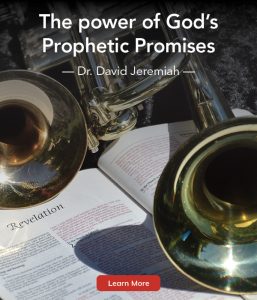In the early years of World War II, German forces quickly conquered almost all of continental Europe. Hitler’s eyes then fell on the prize of Great Britain. If he could send invasion forces across the English Channel and conquer England, his European conquest would be complete.
England’s new prime minister, Winston Churchill, was determined to keep that from happening. And he knew the only nation on earth that could save Europe from falling to the Nazis was the United States. During the German air attacks on England in 1940–1941, Churchill was making entreaties to the American president, Franklin D. Roosevelt, who had been determined to keep America out of the war in Europe. But Churchill never gave up hope that America would come to Europe’s aid. When Japan attacked Pearl Harbor on December 7, 1941, America took a stand, declaring war on Japan and actively supporting Allied forces in Europe.
Why did Churchill never give up hope that America would come to Europe’s aid? It was not because of a verbal promise written or spoken in the early years of the war, but because of the promise of character. America had become the bastion of freedom and democracy in the world, and Churchill was confident that such virtues would ultimately manifest themselves in America choosing to defend freedom and democracy in Europe. And he was right, as history reveals.
There are three parts to promise making: the promise itself, the character of the promise maker, and the keeping of the promise. Before a promise is ever verbalized, character can lead us to expect that a promise is forthcoming and that it will be kept.
 Sadly, human frailty is the source of many unkept promises. Whether it is politicians making promises in exchange for votes, financial charlatans making promises in exchange for investments, individuals making promises in exchange for favors . . . history is littered with the broken remains of unkept promises.
Sadly, human frailty is the source of many unkept promises. Whether it is politicians making promises in exchange for votes, financial charlatans making promises in exchange for investments, individuals making promises in exchange for favors . . . history is littered with the broken remains of unkept promises.
In 1990, a former college football coach, Bill McCartney, formed a movement called Promise Keepers to call Christian men back to their roles of virtuous leadership in their families, churches, and communities. A primary focus of Promise Keepers has been to call men to keep their promises to love their wives and children. Millions of men have attended Promise Keepers events around the world, evidence of the latent power that can be unleashed when promises made become promises kept.
One of my favorite authors, the late professor Lewis Smedes, wrote about promises: “What a marvelous thing a promise is! When a person makes a promise, she reaches out into an unpredictable future and makes one thing predictable: she will be there even when being there costs her more than she wants to pay. When a person makes a promise, he stretches himself out into circumstances that no one can control and controls at least one thing: he will be there no matter what the circumstances turn out to be. With one simple word of promise, a person creates an island of certainty in a sea of uncertainty.”1
Smedes also said, “If you have a ship you will not desert, if you have people you will not forsake, if you have causes you will not abandon, then you are like God”2—which brings me to the subject of this article: the power of God’s prophetic promises.
In our world of uncertainty, it is important for us to remember that God has a people He will not forsake and a cause He will not abandon. And He has made promises to that effect in His Word. God has made “exceedingly great and precious promises” by which it is possible for us to escape “the corruption that is in the world” (2 Peter 1:3-4). That corruption is both temporal—the ability to rise above the power and presence of sin—and eternal—the replacing of a creation corrupted by sin with a new earth that reflects the glory of God (Revelation 21).
It is God’s prophetic promises that give us both temporal and eternal hope.
The Promise Maker’s Past
For the purpose of this discussion, I’m calling a promise any statement of intent: “I’ll meet you there at 4:00 o’clock.” “I will definitely pray with you about that.” “Dad and I will be there for your volleyball game.” “You’ll have the check on the first of every month.” Such statements don’t have to be accompanied by “I promise” to be taken as a promise. As Jesus said, “But let your ‘Yes’ be ‘Yes,’ and your ‘No,’ ‘No’” (Matthew 5:37). God’s Word is His bond and so should ours be.
When someone makes you a promise, you immediately have a response. You are either confident that the promise will be kept, might be kept, or not be kept. And what determines your reaction? Faithfulness in keeping past promises or statements of intent. Faithfulness in the past determines confidence in the present; faithfulness is a key component of character.
When it comes to God and His promises, we have every reason to believe His prophetic promises about the future will be kept because of His record of promise keeping in the past:
- Abraham: God promised to bless the world through Abraham (Genesis 12:1-3). He promised Abraham that his descendants would spend four hundred years in slavery and then be delivered (Genesis 15:13-14). He promised Abraham and Sarah a son in their old age (Genesis 17:15-21). All these promises, and more, came true.
- David: God promised the teenaged David that he would be king of Israel and that one of his descendants would always sit on the throne (1 Samuel 16:1-13; 2 Samuel 7:12-16). This promise was fulfilled (and will be ultimately fulfilled when the Son of David ascends to David’s throne on earth—Acts 2:29-36).
- Israel: God promised that the Jews’ captivity in Babylon/Persia would last seventy years—and it did (2 Chronicles 36:20-23; Jeremiah 25:11-12; Daniel 9:2).
- Jesus the Messiah: God promised the Messiah would be born of a virgin (Isaiah 7:14), be born in Bethlehem (Micah 5:2), be betrayed by a friend (Zechariah 13:6), and suffer for the sins of His people (Isaiah 53). These, and many more prophecies concerning Christ, were all fulfilled.
No Old Testament prophecy has been found to be inaccurate—like the Messiah being born in a town other than Bethlehem. That gives us every reason to believe that prophecies yet to be fulfilled will be fulfilled.
Isaiah 46:9-11 says, “Remember the former things of old, for I am God, and there is no other; I am God, and there is none like Me, declaring the end from the beginning, and from ancient times things that are not yet done, saying, ‘My counsel shall stand, and I will do all My pleasure’. . . . I have purposed it; I will also do it.”
The Promise Maker’s Future
Let me link together the words of two wise men—one concerning the purpose of prophecy and one concerning the power of a promise.
About prophecy, the apostle Paul wrote that prophecy brings “edification and exhortation and comfort to men” (1 Corinthians 14:3). And remember what Lewis Smedes wrote about promises, “When a person makes a promise, she reaches out into an unpredictable future and makes one thing predictable…. With one simple word of promise, a person creates an island of certainty in a sea of uncertainty.”
See the connection? The world has never been in such a state of uncertainty as it is today. It seems that everything we used to think was stable is being juggled in the air by an unseen disrupter. We never know upon rising what new crisis or calamity has occurred while we were asleep. Our phones, tablets, and computers provide a never-ceasing succession of reasons to wonder and worry about the present and future of our world and our lives.
But wait—prophecy is given for just such times as these. Prophecy edifies—it builds us up in the midst of a world that is crumbling. It exhorts—the promises of God’s plans and purposes give us reasons to walk in paths of righteousness. And above all, it comforts—prophecy tells us that God is our “island of certainty in a sea of uncertainty.”
Biblical prophecy—God’s promises for the future—should be part of every believer’s Bible reading program. Be edified, exhorted, and comforted as we walk into the future that God has ordained. It is God’s faithfulness in keeping past prophetic promises that tells us to trust Him for the future.
ABOUT THE BOOK
Where Do We Go From Here? How Tomorrow’s Prophecies Foreshadows Today’s Problems
Dr. David Jeremiah
National Bestseller–New York Times, USA Today, Wall Street Journal, & Publisher’s Weekly
 Today’s headlines shout of modern plagues, social tensions, economic crises, and rampant depression. Many are asking, what day is it on God’s prophetic calendar? Trusted Bible teacher and Pastor, Dr. David Jeremiah opens up the Word of God to reveal what it has to say about the days we are living in.
Today’s headlines shout of modern plagues, social tensions, economic crises, and rampant depression. Many are asking, what day is it on God’s prophetic calendar? Trusted Bible teacher and Pastor, Dr. David Jeremiah opens up the Word of God to reveal what it has to say about the days we are living in.
Sharing how prophecies and wisdom from centuries ago still speak the truth today and point the way forward for tomorrow. Whether one is new to biblical prophecy or a longtime student of the Bible, this timely message will encourage and recalibrate us to the mission of God in our daily lives. Journey with Dr. Jeremiah back to the Bible to find out, Where Do We Go from Here?

